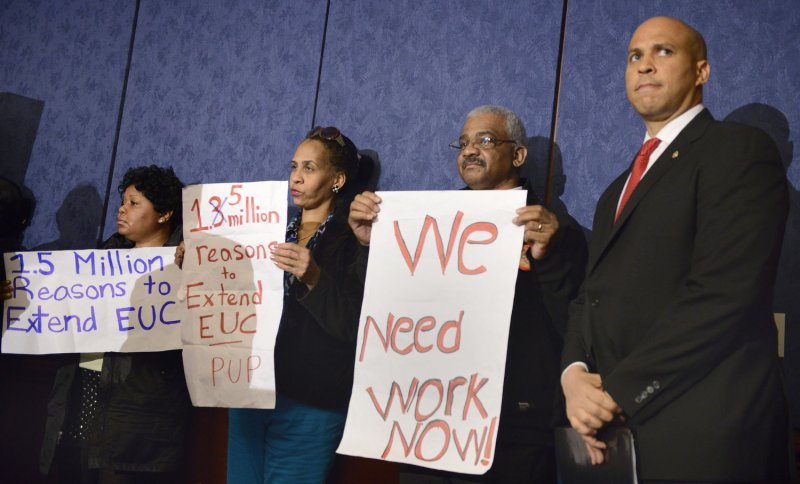US Sen. Cory Booker (D-NJ), (R), stands with labor leaders during a press briefing to rally support for Congress to renew unemployment insurance benefits, which earlier failed to pass because of Republican opposition, at the US Capitol, January 16, 2014, in Washington, DC. UPI/Mike Theiler |
License Photo
Friday marks two full months since 1.3 million long-term unemployed people lost their extended benefits and their numbers have swelled by 576,000 since.
The nearly 1.9 million represents almost half of the more than 4 million U.S. workers who have been searching for work for more than 26 weeks. That doesn't count the millions more who have dropped out of the workforce, in discouragement, since the start of the Great Recession.
In those two months, Congress has made little progress.
The Federal Reserve's Open Markets Committee minutes released last week expressed unease about the situation, rolling back on an earlier assessment that it could ease monetary policy substantially once unemployment falls to 6.5 percent (the January figure was 6.6 percent, largely because of the number of people who dropped out of the labor pool). The meeting was the last over which Ben Bernanke presided before turning over the reins to Janet Yellen.
"The maximum level of employment is largely determined by non-monetary factors that affect the structure and dynamics of the labor market," the minutes from the Jan. 28 meeting read. "These factors may change over time and may not be directly measurable. Consequently, it would not be appropriate to specify a fixed goal for employment; rather, the committee's policy decisions must be informed by assessments of the maximum level of employment, recognizing that such assessments are necessarily uncertain and subject to revision."
In testimony before the House Financial Services Committee Feb. 11, Yellen said the Fed expected to keep its federal funds rate at the current level -- 0.25 percent -- even if the unemployment rate falls to less than 6.5 percent.
The January unemployment report from the Bureau of Labor Statistics indicated only 113,000 new non-farm jobs were created, far fewer than needed for the 499,000 people who entered the workforce and the second disappointing report in a row. The number of unemployed is put at 10.2 million, more than 3.6 million of whom are in the long-term category and 2.6 million more who receive no benefits but are available for work. Of those who have jobs, 7.3 million are working only part-time, unable to find full-time employment.
Thursday's initial unemployment claims report indicated first-time filings are running 336,000 a week, down 3,000 from the previous week and virtually even with the four-week average.
All this means mounting pressure on Republicans, who have repeatedly voted down reinstating extended benefits.
In the Senate, Majority Leader Harry Reid, D-Nev., has twice forced votes on legislation that would extend benefits but Republicans have refused to allow the measure to come to the floor. He has vowed to keep bringing the bill up and seven GOP senators want it to stop, especially the centrists who are not catering to the hard right and have to face voters in high-unemployment states.
Politico reported last week Republicans are working on a plan to revive benefits for three months retroactively. Paying for it involves cracking down on people receiving both unemployment and disability. They're also talking about federal pension reform.
"The substance is there for an agreement," Sen. Dan Coats, R-Ind., told Politico.
"If we do extend it, they want to see reforms."
The stalemate is not just affecting individuals and politics. Democrats on the House Ways and Means Committee released a report indicating the standoff cost the economy $3 billion in January and February.
"The loss of long-term unemployment benefits is weighing down our economy at a critical point in the economic recovery, threatening to inflict long-term damage," said Sander Levin, D-Mich., the ranking Democrat on the House Ways and Means Committee.
"Long-term unemployment remains an enormous challenge for millions of Americans and our overall economy, which is exactly why Republicans should join with Democrats to renew this important program."
Michael Strain of the American Enterprise Institute urged Congress to renew the extended benefits, saying the falling unemployment rate is deceptive.
"A falling unemployment rate is good if the unemployed are transitioning into employment," Strain wrote. "A falling unemployment rate is not good if the unemployed are losing hope and giving up their job search entirely. Getting more people -- especially the long-term unemployed -- into jobs should be the major focus of federal economic policy in 2014."
A Gallup poll released last week indicated 25 percent of Americans view unemployment as the nation's top problem, with the economy a close second at 20 percent. The poll of 1,023 adults was conducted Feb. 6-9 and has an error rate of 4 percentage points.
So lawmakers will have to face the issue when they return Wednesday following a weeklong recess. In the meantime, 72,000 more people face losing their benefits the first week in March as politicians quibble.















